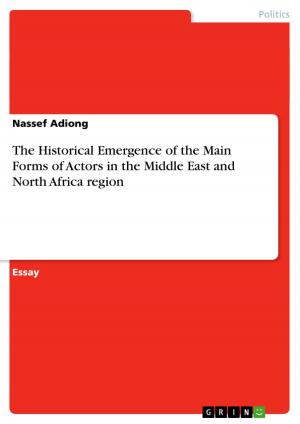Intelligence reform and counterterrorism effectiveness
A structural approach
Nonfiction, Social & Cultural Studies, Political Science| Author: | Stefan Meingast | ISBN: | 9783638037129 |
| Publisher: | GRIN Publishing | Publication: | April 16, 2008 |
| Imprint: | GRIN Publishing | Language: | English |
| Author: | Stefan Meingast |
| ISBN: | 9783638037129 |
| Publisher: | GRIN Publishing |
| Publication: | April 16, 2008 |
| Imprint: | GRIN Publishing |
| Language: | English |
Essay from the year 2005 in the subject Politics - International Politics - Region: USA, grade: A, University of Cincinnati, language: English, abstract: Subsequent to the 9/11 terrorist attacks, a sustained effort has been undertaken to reform the American intelligence agencies. The establishment of a terrorism 'czar', with more authority than the Director of the CIA used to have as coordinator of the intelligence enterprise and with a supporting bureaucratic structure to this end should lead to more unified, coordinated and effective intelligence, in particular in the context of counterterrorism. The Intelligence Community has undergone previous organisational 'centralisation' reforms, and yet, it failed to provide timely and accurate intelligence about the 9/11 terrorist threat. A series of legitimate questions therefore arise: is centralisation the wrong solution to the problem of intelligence effectiveness? Is rather decentralisation the key? Has structure any influence on the way intelligence agencies perform? Answering these questions would reveal whether the adjustments to the structure of the Intelligence Community are justified or, on the contrary, determined by empirical fallacies, such as the 'quick-fix' reorganisation syndrome. In a broader context, it would be also useful to know whether and how the effectiveness of counterterrorism intelligence could be improved by means of organisational structure. This research question implies the scholarly literature of two disciplines: organisation theory and political science (International Relations and Security Studies - Terrorism). The nature and functioning of organisations, in particular, decentralisation and its effects on effectiveness have been studied at the level of business and bureaucratic organisations, whereas studies on intelligence and its effectiveness are present within a broad range of security studies areas, including the newer - terrorism/ counterterrorism. Answering the above research question would therefore mean applying theories and evidence in the organisation theory and organisational behaviour literatures to the terrorism/ counterterrorism one.
Essay from the year 2005 in the subject Politics - International Politics - Region: USA, grade: A, University of Cincinnati, language: English, abstract: Subsequent to the 9/11 terrorist attacks, a sustained effort has been undertaken to reform the American intelligence agencies. The establishment of a terrorism 'czar', with more authority than the Director of the CIA used to have as coordinator of the intelligence enterprise and with a supporting bureaucratic structure to this end should lead to more unified, coordinated and effective intelligence, in particular in the context of counterterrorism. The Intelligence Community has undergone previous organisational 'centralisation' reforms, and yet, it failed to provide timely and accurate intelligence about the 9/11 terrorist threat. A series of legitimate questions therefore arise: is centralisation the wrong solution to the problem of intelligence effectiveness? Is rather decentralisation the key? Has structure any influence on the way intelligence agencies perform? Answering these questions would reveal whether the adjustments to the structure of the Intelligence Community are justified or, on the contrary, determined by empirical fallacies, such as the 'quick-fix' reorganisation syndrome. In a broader context, it would be also useful to know whether and how the effectiveness of counterterrorism intelligence could be improved by means of organisational structure. This research question implies the scholarly literature of two disciplines: organisation theory and political science (International Relations and Security Studies - Terrorism). The nature and functioning of organisations, in particular, decentralisation and its effects on effectiveness have been studied at the level of business and bureaucratic organisations, whereas studies on intelligence and its effectiveness are present within a broad range of security studies areas, including the newer - terrorism/ counterterrorism. Answering the above research question would therefore mean applying theories and evidence in the organisation theory and organisational behaviour literatures to the terrorism/ counterterrorism one.















